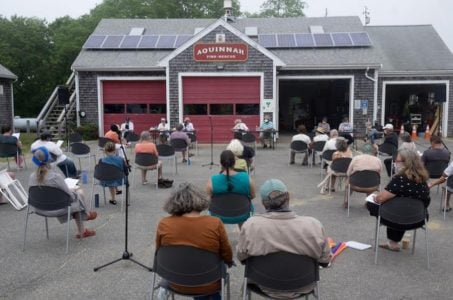Michigan Tribe Sued for $124 Million Over Derailed Lansing Casino Project
Posted on: April 8, 2020, 04:03h.
Last updated on: April 8, 2020, 10:47h.
Developers behind a no-go casino project in Lansing, Michigan are suing their former partners, the Sault Ste. Marie Tribe of Chippewa Indians, for at least $124 million, claiming breach of contract and misappropriation of funds.

The Chippewa announced plans back in 2012 to build a $250 million casino in Lansing’s entertainment district, to be known as the Kewadin Lansing. But legal opposition from other tribes and the state of Michigan delayed the project.
In 2014, the tribe applied to the US Interior Department to have the plot earmarked for the casino to be placed into trust. This is where the federal government partially removes land from the jurisdiction of the state, a process necessary for the establishment of a tribal casino on land that is not part of a reservation.
Land Going Back to City
In 2017, the DOI rejected the Chippewa application. Among the reasons cited by the DOI’s Bureau of Indian Affairs (BIA) was that the Lansing parcel was too far from the tribe’s headquarters (260 miles) to “enhance” its reservation.
Despite a federal judge ruling earlier this month that the DOI must reconsider the application, the tribe appears to have thrown in the towel.
According to the Lansing State Journal, the Chippewa has begun transferring the Kedawin Lansing land back to the city.
But two companies, JLLJ Development and Lansing Future Development, want to recoup their lost investment and revenues they would have received from the Lansing project.
The plaintiffs claim they were to receive 14 percent of the profits from the moment a temporary casino opened on site, and for the first seven years after the opening of a permanent casino.
The temporary casino, which would have been used to train staff and generate revenue while the main venue was being built, never got off the ground.
Money Spent ‘as Tribe Saw Fit’
Meanwhile, the plaintiffs say they gave the Chippewa’s gaming authority a $9 million loan, which was supposed to be used to acquire land and begin construction work. But the lawsuit claims this sum was misappropriated.
The money was spent “as the Gaming Authority saw fit and not based on any mutually-approved budget,” according to legal documents seen by The Journal.
The suit seeks compensation for loss of revenues in excess of $124 million, as well as damages.
Sault Ste. Marie Tribe of Chippewa was federally recognized in 1972. It owns five casinos in Michigan, all under the Kewadin brand name.
The tribe previously held a majority interest in the Greektown Casino in Detroit, which opened during the 2008 economic downturn. The tribe filed for Chapter 11 bankruptcy protection for Greektown and ultimately sold its interest in the property.
Related News Articles
Most Popular
Genovese Capo Sentenced for Illegal Gambling on Long Island
NBA Referees Expose Sports Betting Abuse Following Steve Kerr Meltdown
UPDATE: Former Resorts World & MGM Grand Prez Loses Gaming License
Jackpot News Roundup: Two Major Holiday Wins at California’s Sky River Casino
Most Commented
-
UPDATE: Whiskey Pete’s Casino Near Las Vegas Closes
— December 20, 2024 — 33 Comments -
Caesars Virginia in Danville Now Accepting Hotel Room Reservations
— November 27, 2024 — 9 Comments -
UPDATE: Former Resorts World & MGM Grand Prez Loses Gaming License
— December 19, 2024 — 8 Comments -
FTC: Casino Resort Fees Must Be Included in Upfront Hotel Rates
— December 17, 2024 — 7 Comments
















Last Comments ( 3 )
Sault Tribe warrants an internal bod’s investigation
Is this why the tribunal of Chippewa Indians is refusing to pay members who do not live on tribal land a stimulus check?
Greektown opened Nov. 2000. Simple google search shows that.